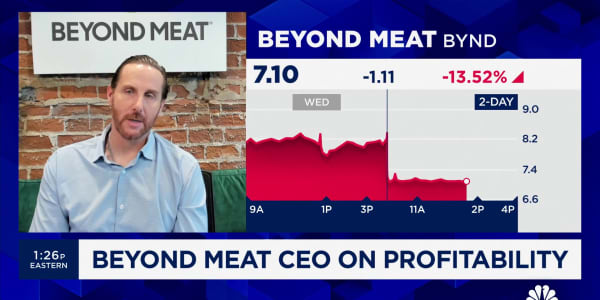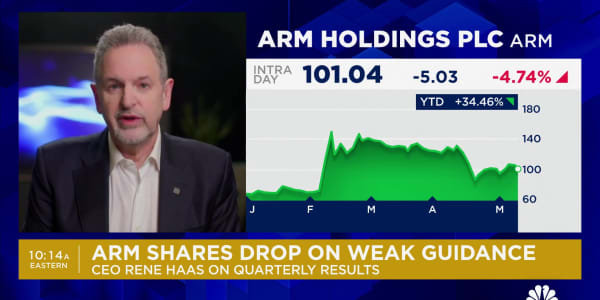
If bitcoin is going to survive as a digital currency, it's going to have to convince investors their holdings are safe.
That's been a huge problem lately as two exchanges recently have shut down due to hacker attacks, drawing unwanted headlines and adding fuel to detractors who believe cryptocurrencies are untrustworthy stores of wealth.
Enter Falcon Global Capital, a San Diego firm launching a fund this month that will offer investors access to insurance should their bitcoins suddenly disappear, as they have for other unfortunate believers operating in the Mt.Gox or Flexcoin exchanges.
That insurance comes through London-based Elliptic, which is willing to stand strongly enough behind bitcoin that it will offer reimbursement for those subjected to theft or other circumstances.
(Read more: Another bitcoin site bites the dust)
Elliptic touts its bitcoin "vault" that reportedly is insured by Lloyd's of London. Should a hacker strike or other security breach cause a loss of bitcoins, they will be insured at that day's bitcoin price, which will be determined through a proprietary index.
"We offer simplicity, security and transparency," Falcon co-founder Brett P. Stapper said in an interview. "We feel if we can take care of these three things it will be beneficial for our company as well as investors getting into bitcoin."
The size and the scope of the Falcon fund are a little sketchy at this point—as one might assume from a start-up delving into the relatively unexplored frontier of cryptocurrencies. Twin investors Cameron and Kyle Winklevoss, who had a well-publicized hand in developing Facebook, are proposing a bitcoin exchange-traded fund that remains under regulatory review.
Stapper said he's received "inquiries" from investors looking to dedicate $10 million for what will be a passively managed fund dedicated exclusively to bitcoin, and the target is for $100 million in assets after six months.
Providing insurance, he believes, will counter the negative headlines, particularly from the Mt.Gox crash, that have called into question bitcoin's viability.
(Read more: Bitcoin's back to the wall as it fights to survive)
A statement on the Elliptic site explains the approach and the firm's stance toward the recent issues:
Problems at Mt.Gox have justifiably caused concern amongst Bitcoin holders around the world. Elliptic Vault maintains all customer funds in segregated, transparent, externally auditable storage. Every customer is able to verify the balance of their account through the blockchain, independently of our service.
Recent events have highlighted the need for proper, accountable storage for people's Bitcoin holdings—something that Elliptic has always understood to be important. Without transparent, full-reserve storage, or the peace of mind that comes from insurance protection, people are always taking a risk when leaving their funds in third-party hands. Elliptic wishes to underline the fact that it provides both transparency and insurance-backing to customers of our Vault service.
Elliptic did not respond to a request for further comment.
Generally speaking, Stapper remains optimistic about bitcoin, a view apparently shared as the price has continued to climb since the Mt.Gox debacle.
"I truly believe in the technology behind bitcoin. That's how I can justify the thinking that the price will dramatically rise," Stapper said. "The technology, the platform, the protocols behind bitcoin are truly revolutionary if people can understand them."
Still, the broader investing public may need more convincing that bitcoin is trustworthy.
Making that happen could be the job of regulators, who currency experts believe will step in soon and take a closer look at how to protect bitcoin owners from future breakdowns.
(Read more: Bitcoin's got the 'Winkdex,' but needs a lot more)
"Bitcoin desperately needs regulation as soon as possible," said Judith Rinearson, a partner at the Bryan Cave law firm in New York who testified in February at the state's Department of Financial Services public hearing on virtual currencies. "Their credibility is going to be more and more at issue."
Rinearson compared bitcoin to the introduction of prepaid debit and credit cards back in the 1990s, when skeptics said they would be susceptible to criminals and wouldn't last. She anticipates that bitcoin, too, ultimately will be looked at not as a currency but as a payment system, similar to Western Union but considerably less expensive.
That would require bitcoin exchanges engaging in compliance programs, registration as a money transmitter and submitting to best-practice guidelines.
"What's most important is that banks, consumers and merchants need the comfort, especially after all this bad news, of understanding where bitcoin fits in our regulated world of payments," Rinearson said. "Once the powers that be figure this out ... I would like to see bitcoin survive for my children and grandchildren. I really do think it's a good product."
—By CNBC's Jeff Cox. Follow him on Twitter @JeffCoxCNBCcom.






